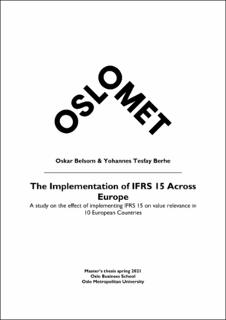The Implementation of IFRS 15 Across Europe A study on the effect of implementing IFRS 15 on value relevance in 10 European Countries
Master thesis
Submitted version
Permanent lenke
https://hdl.handle.net/11250/2823469Utgivelsesdato
2021Metadata
Vis full innførselSamlinger
Sammendrag
This paper evaluates the effect of International Financial Reporting Standard 15 (IFRS 15) on
value relevance. The European Union (EU) required all companies listed in the EU to adopt
IFRS 15 for fiscal years starting after 1 January 2018. IFRS 15 is anticipated to result in a
closer association among accounting based and market-based performance, also called
value relevance. To provide insight into the effects of the change to IFRS 15 on value
relevance, this paper reviews literature on the consequences of changing accounting
principles and makes an empirical analysis based on 1830 listed firms in 10 countries in the
EU. The purpose of the study is to examine whether IFRS 15 provides more value-relevant
accounting information compared to previous revenue recognition standards, such as
International Accounting Standard 18 (IAS 18) and IAS 11. The differences among the pre-
IFRS 15 period and the IFRS 15 period is studied through econometrics analysis. We conduct
panel regression analysis to determine the explanatory powers of Book value per share
(BVPS) & Earnings per share (EPS) on Share price for the two periods via their R2. Using the
R2, a test of difference using the Cramer z – statistics (Cramer 1987) for the two periods was
conducted. The finding for the whole sample revealed that the relation between accounting
values and stock prices is stronger for European listed companies after the adaption of IFRS
15. This is caused by a harmonisation between countries, and an increase in the relevance of
BVPS. The change, however, is not consistent across European countries. The findings
revealed that the predictive power of accounting values on share price have major differences
between countries. Within countries there are more decreases than improvements in value
relevance.
